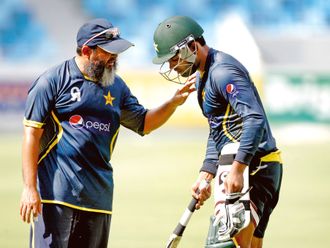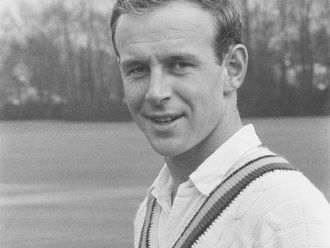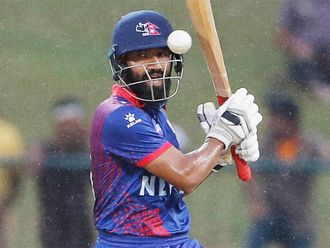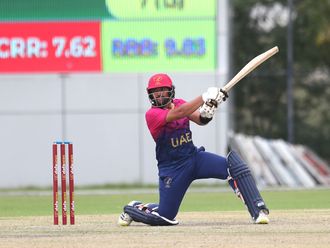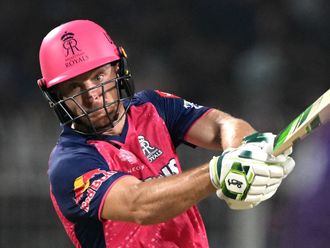Johannesburg: It’s safe to describe David Warner as underestimated. He has fans by the millions, drawn to his thrilling style of play. He also has detractors who portray him as a meathead whose only ability is to tenderise a cricket ball.
Even as a cricketer, critics portray him as a T20 slogger who loses his wicket to rash shots. The reality is that few batsmen in the world know their own game as deeply, and while 21 Test centuries already puts him among Australia’s elite, he could yet double that tally.
It was only four years ago that Warner truly proved he belonged as a Test batsman, on a tour of South Africa in early 2014. After chopping on cheaply to Dale Steyn in his first innings, he decided he couldn’t afford to worry any more.
“I remember there were a couple of sleepless nights thinking ‘How am I going to play these guys? How am I going to score runs? I think I put a lot of pressure on myself,” he said via ‘The Final Word’ podcast .
“Then, after that first innings at Centurion when I got out [I thought], ‘Just go out there and play cricket.’ I came out and took the game on. I got bombarded with a fair few short-pitched balls. They didn’t really pitch much up, and I just backed my game plan.”
Warner made a hundred in the second innings, twin fifties at Port Elizabeth, then twin centuries at Cape Town, the same venue where Australia had been humbled for 47 runs in 2011. The bowling was fierce, with Steyn leading the charge and Morne Morkel doubling as a human trebuchet.
Chris Rogers feared for his career, Michael Clarke had to get ready for a broken arm. “It was feisty,” Warner recalls. “An absolutely amazing series from a batsman-versus-bowler point of view.”
Yet he found perfect control, and prospered.
Four years later, he’s back in South Africa, this time for four Tests rather than three. Morkel will retire after this series and Steyn is in doubt with an ankle problem, but South Africa have since found Kagiso Rabada and Lungi Ngidi, while Vernon Philander remains evergreen.
“Now, it is about how am I going to still go out there and replicate what I did in the past, because obviously we are in the present now. So I have to start here, fresh,” says Warner.
That he’s here at all is borderline absurd, given he captained Australia’s Twenty20 team through a two-week tri-series that followed a one-day series, the Ashes, and a jam-packed 2017.
A few hours after receiving the T20 trophy in Auckland on a Wednesday night, he was on a plane to Johannesburg and will open the batting one Thursday later in a Test. The Test series finishes in April, whereupon he’ll go straight into the Indian Premier League.
“It is a question that I keep asking myself,” he says of whether this is sustainable. “It does have its challenges, but you are living the dream. I want to play cricket for Australia.”
If there is an opportunity for me to play all three forms if the schedule dictates, I’ll want to play that. And that’s just how I’ve always been. People who know me, if I have one or two days off here and there, I am rejuvenated and refreshed.”
But it’s not just playing, it’s taking over the T20 and one-day sides when regular captain Steve Smith needs a rest. Warner clearly enjoys filling in, bringing a relentless energy and enthusiasm to the sides he leads.
“I just like having responsibility,” he says. “I feel it is important we do have a senior player playing in all three formats.”
Just as recent years have seen a brash and cavalier batsman find control, a similar shift has happened personally, with Warner turning to meditation and mindfulness training to clear his head and aid his concentration.
He quit drinking for two years and claims to be less confrontational on the field. That doesn’t mean he’s given up stirring the pot, though.
Various outlets and individuals laid into him for comments he made before the recent Ashes series, when he invoked the metaphor of going to war.
“It was amazing,” he laughs, “because I went to Google and typed in ‘war’. And I looked up numerous sports stars, actors, and everything [sic] who have used the same terms in everyday stuff. It was just a beaten up thing, which is as normal.
“But for me, it was about how I go about my business. You have to be in the zone. What gets me up and going is a little bit of banter. It’s not just an Ashes series, but the talk and the hype around Ashes.
“You are always going to say something in the media. That’s what I love doing... [being] the pantomime villain. If you want to be that person, you want to be. And that’s me. I love that in that series. And I’ll do it again if I get selected in the pending Ashes series next year.”
He grins unashamedly, and you get the feeling he’s generally having a lot more fun than the people telling him off.
But there’s always a level of complexity to Warner. This is the same man who in 2017 became the leading voice for professional cricketers in their pay dispute with Cricket Australia. Opponents tried to discredit him as greedy and rich, despite his distinctly unprivileged start to life, and the fact that his intervention was about representing state cricketers at the bottom of the food chain.
“If you believe in something, you are going to have to fight for it, and I wasn’t going to stand down because we needed someone out there to speak about it.”


